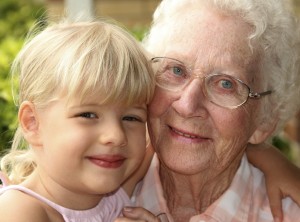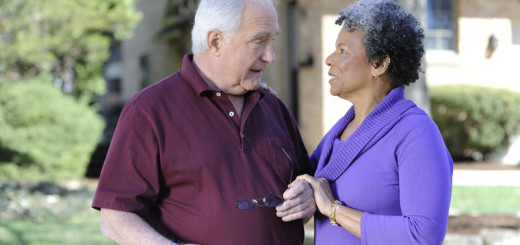Talking to Kids about Alzheimer’s Disease
 The rule of thumb when talking to kids about Alzheimer’s Disease (AD), is to be simple and honest, try and educate them (age-appropriately), and realize that they may be having a lot of feelings that they may not be able to – or want to – articulate. Those feelings may be wide-ranging, from concern about their loved one (many times this is a grand-parent), to conflicted feelings about their loved one’s caregiver (many times this is actually the child’s parent who now has less time for the child), to feelings of embarrassment around their peers.
The rule of thumb when talking to kids about Alzheimer’s Disease (AD), is to be simple and honest, try and educate them (age-appropriately), and realize that they may be having a lot of feelings that they may not be able to – or want to – articulate. Those feelings may be wide-ranging, from concern about their loved one (many times this is a grand-parent), to conflicted feelings about their loved one’s caregiver (many times this is actually the child’s parent who now has less time for the child), to feelings of embarrassment around their peers.
Watch for behavioral or social changes, such as a child not inviting friends over after school. Mention the diagnosis to teachers and parents of your child’s friends, so they can offer support. Provide opportunities for your kids to ask questions and suggest they journal their feelings. If they seem receptive, involve kids in the caregiving process; perhaps they can spend time with your loved one assembling a puzzle or listening to music, while you cook dinner. Meet regularly as a family and don’t forget that it is important for your family to get respite from caregiving. Children need to re-connect as a family outside of the family’s caregiving role.
Things Kids Need To Know
Younger children in particular need to know that the “disease” isn’t contagious. Because someone in the early stages of AD doesn’t “look” sick, it is often hard for kids to understand why Grandma behaves in an unfriendly or even scary way. You need to point out that this behavior is the disease, not Grandma; and provide reassurance that Grandma still loves them. Encourage children to try and enjoy each opportunity with their loved one. Tell them to focus on demonstrating simple signs of love and kindness, a hug or holding a hand”¦that such feelings will be felt in the moment, if forgotten later on. Having kids create and share a scrapbook or photo album with their loved one may bring them comfort.
Examples of other families coping with the disease can be helpful. There are many children’s books that tell stories about a loved one having AD. Older kids may also benefit from increasing their knowledge on the disease, perhaps doing a school science project on it.
The Alzheimer’s Association has created videos specifically for kids and teens. There is a 4-part series that covers a simple description of the disease, the changes to expect, how to talk about the disease with friends, and how children can help their loved one and family. In the videos, kids are taught that AD effects how a person’s brain deals with thinking (memory) and feeling (mood and personality), and how these changes get worse over time. Some highlights:
In the early stage, a child will start to see issues in their loved one’s short-term memory and mood. Grandpa will start to lose things or not be able to come up with a particular word; that will frustrate him and he may become moody. You can help children find an enjoyable activity that can be shared with their LO, such as music or a hobby. Emphasize all of the things that a loved one can still do and enjoy.
In the middle stage, children will see their loved one’s loss of independence, and difficulties with discussions and everyday tasks. Suggest that children use short/simple sentences and that they ignore mood changes and forgetfulness. Remind children to be patient and that the behavior is not intentional or directed at them.
In the late stage, children will see their loved one have serious communication problems; perhaps no longer able to recognize family members. Suggest that children introduce themselves at the start of a visit, and that they try to connect using non-verbal means such as touch, smell, taste or even music, since words will be difficult. Long-term memories may be evoked from these senses, and touch can be comforting.
By continuing a proactive conversation with your child as your loved one’s disease progresses, and by validating your child’s feelings, you can better prepare that child for the changes to come. And don’t forget that along with the feelings and stress over the loved one’s disease, your child may be sensing YOUR caregiver tensions and stress! Talk to children about that as well. They need to understand that Mom or Dad isn’t upset with them, but is upset at the difficulties and rigor of caregiving.
Blog written by Alzheimer’s Association Volunteer Diane Blum
Click here for more caregiver tips and expert advice from Family Care Specialist Stephanie

















